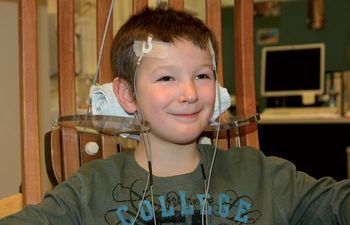
Research Team Music and Brain
E-mail: info@musicandbrain.de, Tel: +49(0) 176 62411277

AMseL-Study (Audio- and Neuroplasticity of Musical Learning)
In our research project we want to examine how the regular practise of music works on hearing ability and on non musical faculties (creativity, intelligence, reading, spelling and calculation).
AMseL I
In the first part of the research, funded by BMBF (2009-2012), which we undertook with scientists from the University of Graz, we took about 160 children. In order to study not only the short term effects but also the long term effects, we followed the children for two years with neurological measurements (MRI to acquire the brain anatomy and fMRI to measure brain blood flow while hearing sounds), auditory computer tests and psychological tests.
Half the children we examined took part in the music education acceleration programme "Jedem Kind ein Instrument" (“For Every Child an Instrument”), which is offered in the regions of the Ruhrgebiet and Hamburg (JeKi in the Ruhrgebiet: www.jedemkind.de; JeKi in Hamburg: www.jeki-hamburg.de). The other half of the children were invited from the region around Heidelberg and Mannheim where such an acceleration programme is not available.
The AmseL project was undertaken in the framework of the JeKi longitudinal research as a joint venture of the Universities of Heidelberg and Graz. At the centre of the project part 1 stands the examination of the relationship between musical learning and brain biology as well as psychometric (psychological) characteristics. In particular the anatomy of the auditory cortex and its activation through hearing of tones/sounds was examined.
The emphasis of the second sub-project (Institute of Psychology of the University of Graz; Leader: PD Dr. Annemarie Seither-Preisler) creates survey questionnaires, the examination of speech orientated hearing function, possible transfer effects in the realm of cognition (intelligence, creativity, attention, spelling, calculation) as well as the effects on AD(H)D type behaviour (attention disorder, hyperactivity, impulsivity). online.uni-graz.at/kfu_online/visitenkarte.show_vcard
In both sub-projects a comparison of general musical effects as well as the effects of in school JeKi training and conventional extra curricular instrument lessons.
Download - Aufsatz von Daniel als PDF
Download - Bericht in Unizeit als PDF
AMseL II
Maturing processes in elementary and complex hearing abilities and auditory attentiveness in children participating in “For Every Child an Instrument” (JeKi)
In the subsequent second research section (autumn 2012 - autumn 2015), the children of the first study phase will be invited to a third course of assessment in the Neurological Clinic of the University of Heidelberg. In addition, children and adolescents with ADD, ADHD or LRS are recruited as new subjects (age range 7-15 years).
WRONG TENSE
This should make it possible to make more precise statements as to the effect of intensive music playing on these groups of children on the basis of the neurological and psychometric measurements.
In addition, the study of the maturing processes of hearing performance and their neural correlates will be extended to the aspect of attention. This should allow conclusions to be drawn as to the extent to which the previously observed clearly music-related changes are due to a training of sensory abilities (elementary and complex hearing functions) and / or a training of attention functions that modulate the sensory system.
In co-operation with JeKi music teachers, the influence of our research results on certain JeKi-specific pedagogical approaches to music (individual design of music lessons, teacher-pupil relationship, access to musical instrument, ensemble behaviour, form of music lessons for outstanding children) will be determined in the longer term and are tested and used directly in lessons.
















